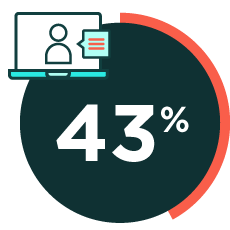Is your healthcare business ready for AI?
AI has the potential to transform healthcare, but it requires a network that can handle the increased data workloads with agility and speed. Explore these four actionable steps that will help ensure your network is AI-ready to deliver personalized, secure, 24/7 access for patients, providers, employees and more.

Enable seamless healthcare processes with high‑speed networking
Expand your bandwidth
AI applications can provide medical practitioners with a real-time, holistic view of a patient’s health status, but they require high-speed data transmissions and more bandwidth than legacy infrastructure can provide. Without a reliable, modern network, healthcare companies could face delays when processing, analyzing and acting on the data that is at the core of AI applications.
Improve operational efficiency

92% of healthcare leaders see the promise of Generative AI for improving efficiency.1

Reduce the risk of a devastating cyberattack or regulatory error
Avoid breaches and fines
Healthcare companies handle vast amounts of confidential information that is extremely valuable to threat actors. This is why healthcare AI models are ripe targets for model manipulations and data poisoning, which can leave your organization more vulnerable to attack. At the same time, you must ensure your network complies with a complex and dynamic regulatory framework.
Maintain data integrity and business uptime
With proactive security strategies, healthcare companies can protect their AI systems and stay ahead of emerging threats. Building a trustworthy operational environment also helps ensure AI systems' data are accurate and secure, which can help safeguard patient information and save lives.

In 2024, the average cost for a breach in the healthcare industry was $9.8 million, making it the most expensive industry for responding to and recovering from a data breach for 13 consecutive years.2

Bypass data bottlenecks
Traditional network infrastructure can’t keep up with the AI-driven influx of data. This creates bottlenecks as data move inefficiently across a dispersed network to a data center and back. Failure to modernize can cause delays across healthcare environments, which can be particularly detrimental during emergencies or in diagnostic situations where real-time decisions are made.
Minimize latency and maximize speed with edge fabric

Omdia’s AI Network Traffic Forecast, 2023-33 Report predicts that by 2027, AI will be involved in the majority of application content carried by telecom networks.3

Drive fast ROI with expert guidance
Keep your systems running smoothly
Uptime is money, downtime is expensive, and both impact revenue and your reputation. Inefficiently implemented AI systems can become unreliable and frustrating for providers, patients and your employees as they experience delays and inaccuracies. Unmonitored security vulnerabilities can also expose sensitive healthcare data to cyberattacks and bring down the system.
Partner with a trusted adviser
AI implementation will likely fail without expertly designed network infrastructure that supports the powerful AI tools that are quickly spreading throughout the healthcare industry. The right partner can help you implement future-ready network solutions without the need to upskill or increase headcount, so you can put your AI tools to work to help increase revenue; lower costs; create seamless, meaningful user experiences; and minimize risks.
